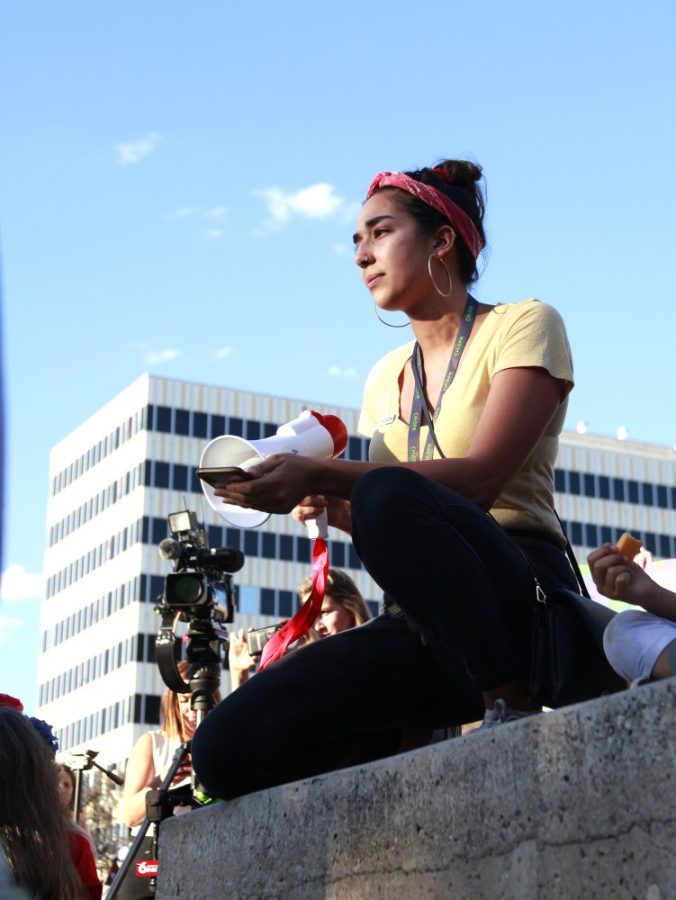As a student of the University of Arizona, it is your responsibility to keep up to date with the doings of the institution and speak out when you feel something is unfair. When you come into contact with something that the university has done that is unjust, there are steps you can take to safely organize protests and other demonstrations to make your voice heard. Quite frankly, the university owes you their time in respect to your involvement and tuition.
Multiple protests were held last September for issues regarding discriminatory faculty (Queers United Coalition versus Dull in September 2019), awareness of the global climate crisis (Arizona Youth Climate Strike) as well as an open letter published in October addressing a racially insensitive comment made by President Dr. Robert C. Robbins (the Native Students Outreach, Access and Resiliency group — or SOAR — versus Robbins). Students have historically held this academic institution responsible for their wrongdoings and shortcomings and brought local attention to large-scale issues. As a new student, do not be afraid of speaking out and taking action for the things that matter to you. The social literacy and support you will find within the student body will be there for you in your activist endeavors. All you really need to know is where to start.
After an issue comes to your attention, start by researching what you can do to change it locally. This can be in the form of a petition, open letter, on-the-ground protest, pulling your financial support, etc. Once thoroughly researched, pick your plan of action. All of these options are most effective when supported by a group of people. Rally your friends together to support the chosen cause. An individual can instigate a conversation on their own, but the “strength in numbers” cliché is popular for a reason.
If you choose to write an open letter, team up with an on-campus group that can help you get your idea across. For example, when there was controversy surrounding the Black Lives Matter demonstration on June 6, the Coalition of Black Students and Allies published an open letter to Robbins paired with a list of demands. Their university affiliation and organized approach added a sense of veracity to their statements and people were more inclined to take it seriously. It’s not that any call for justice is diluted by a lack of organizational backing, but when going up against large institutions such as a college board, getting their attention often takes an air of officiality.
On-campus protests are also an effective way to bring notice to an issue. Before setting a date and rallying people together, begin by looking into the “First Amendment Basics Guidelines” check-list that is available on the Dean of Students homepage under “Student Rights and Responsibilities.” The UA is private property, so make sure that your demonstration fits within the parameters of the “Rally Toolkit” guidelines. It is recommended that the school and the UA Police Department be informed ahead of time to prevent any dismissal. Although, if you request that Tucson Police Department is not present at the demonstration, there is no guarantee that UAPD will not call TPD for backup if they “feel unsafe” or “overwhelmed” by the crowd. Peaceful protests and marches usually go undisturbed if kept to sidewalks, campus and public spaces, but again, this isn’t guaranteed due to the general policing climate we’ve been in. Make sure your collective is prepared with supplies like water, first aid kits, face coverings (for surveillance and health reasons), etc.
RELATED: OPINION: Change starts at home: The young activists behind Never Stay Silent
For undocumented students, protesting in-person can pose added issues. Technically, constitutional rights, including First Amendment protections, pertain to all U.S. residents regardless of immigration status. But if TPD is called to campus and decides to break up the protest for any reason, I would not put escalation and arrests out of the realm of possibility. Always stick with a group at a demonstration, and if you know of anyone that is undocumented, make it a point to update them on things first. This is not brought up to scare anyone away from getting involved, but with the presence of U.S. Border Patrol on campus during spring career days (March 20, 2019), I would not necessarily bank on the consideration of the university to keep students comfortable.
Organizing is the key to social change. Colleges are not the sun-shiney safe spaces they are rumored to be; injustice lives here too. Always do your research before participating in action and never let your fear of being unheard keep you from speaking up in the first place. Every singular voice adds up.
Follow Selena Kuikahi on Twitter









